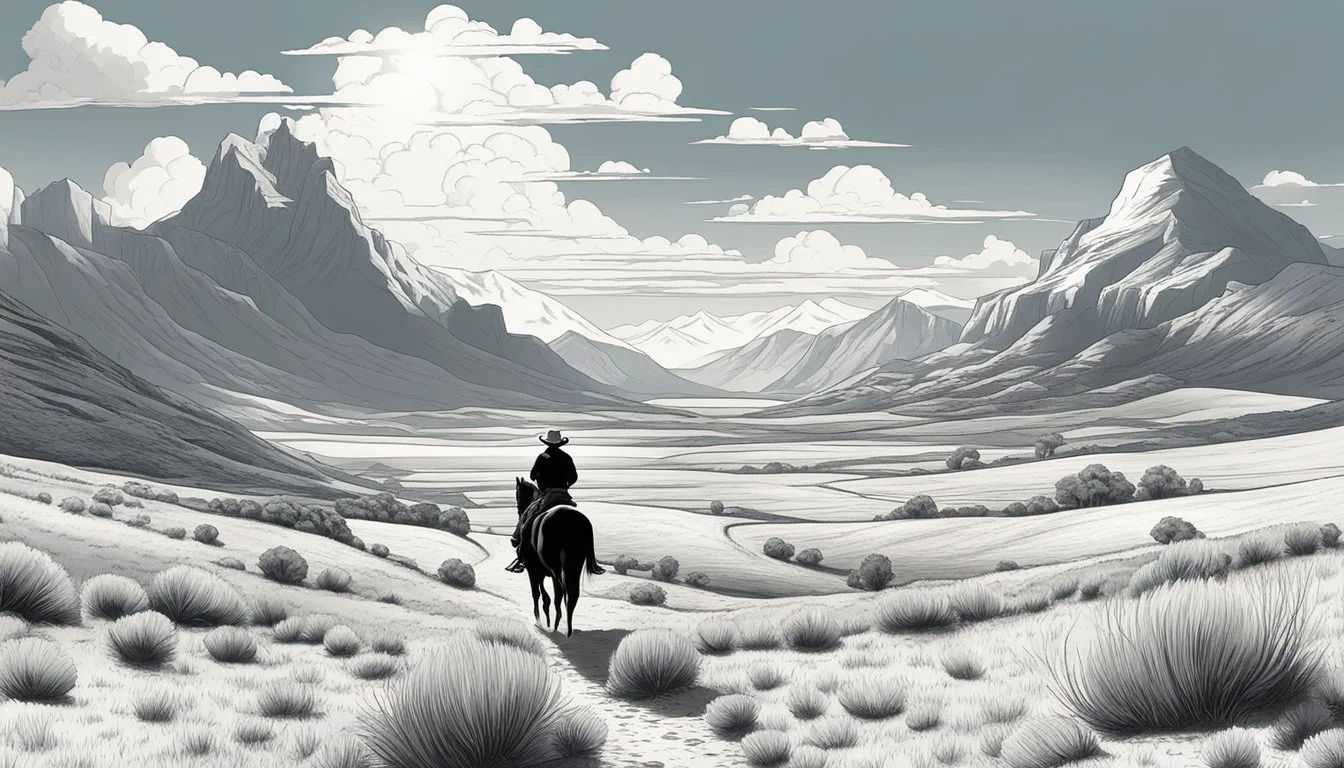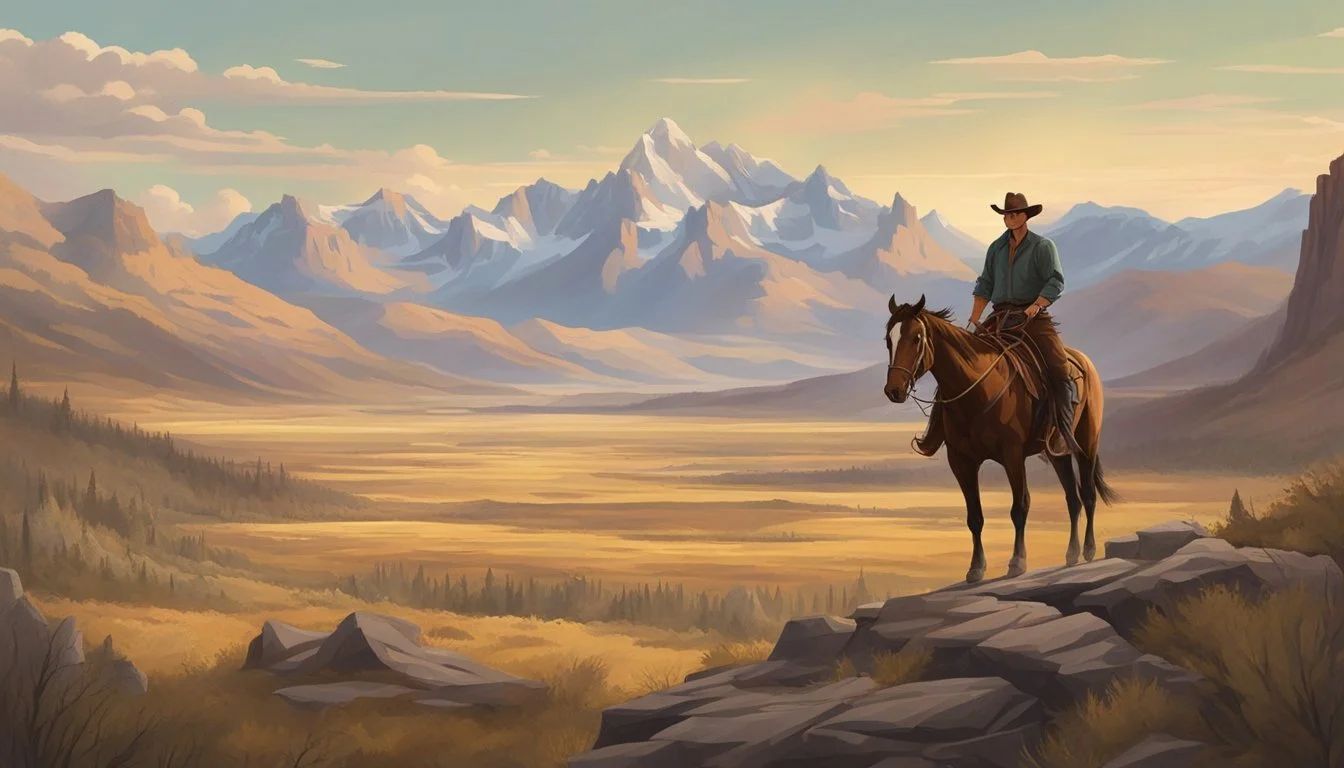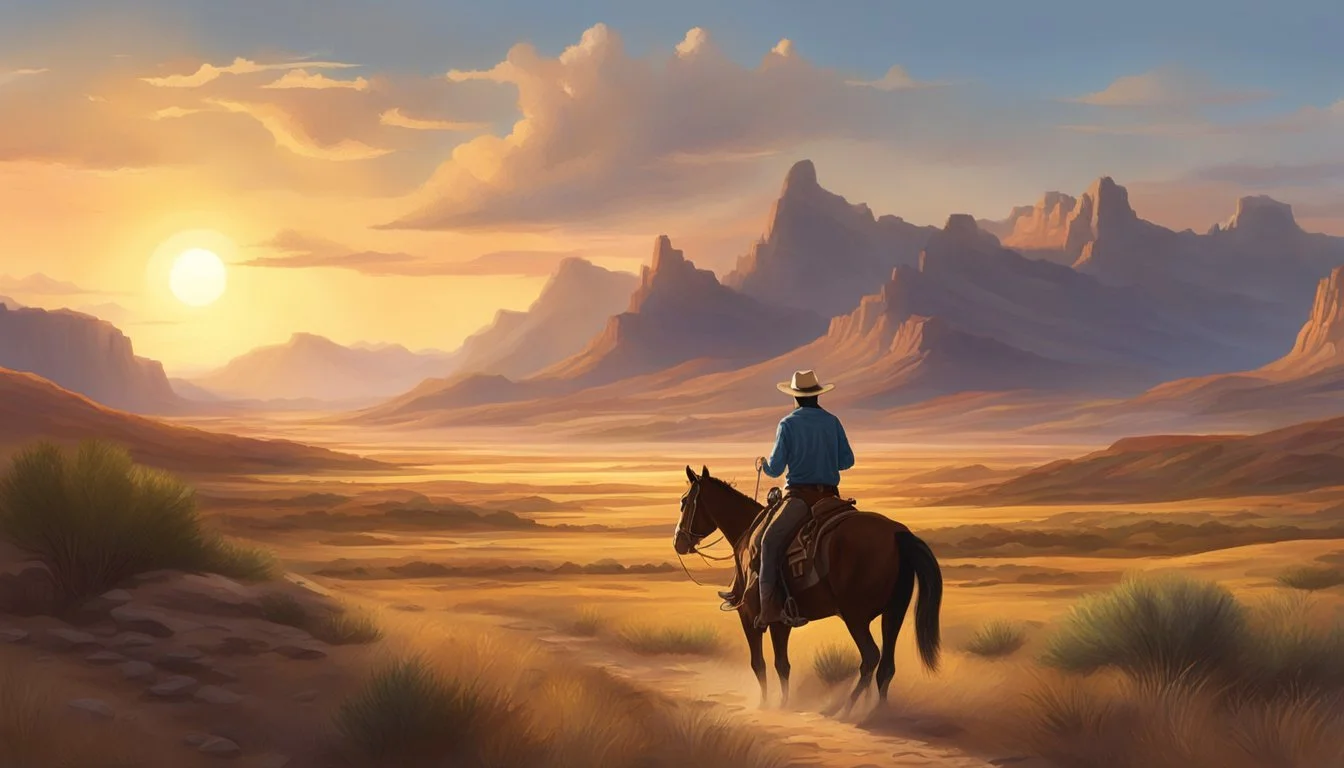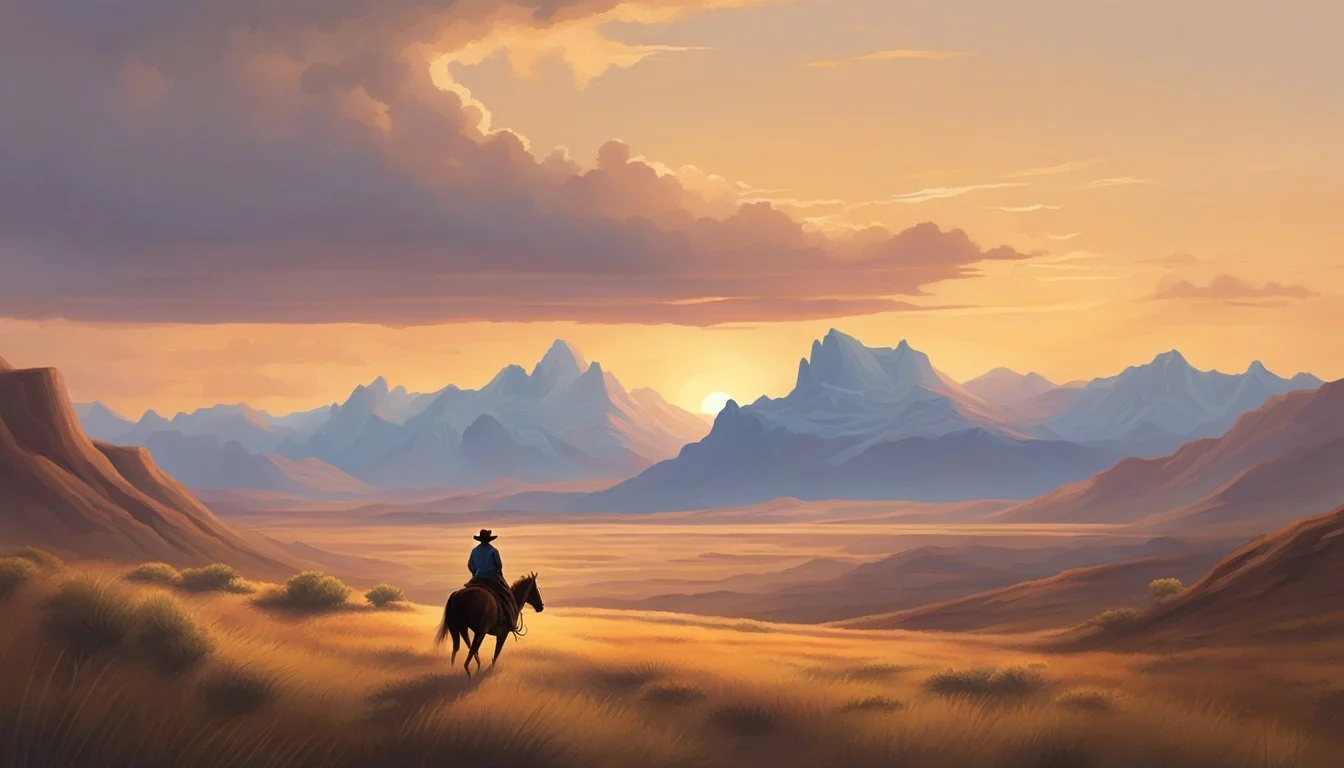Yellowstone Exposes Dark Side of Cowboy Capitalism and Rugged Individualism
Yellowstone, the hit TV series, offers a compelling exploration of cowboy capitalism and rugged individualism in contemporary America. Set against the backdrop of Montana's breathtaking landscapes, the show blends traditional Western themes with modern economic realities. The Dutton family's struggle to maintain their sprawling ranch serves as a microcosm for broader societal tensions.
Yellowstone's portrayal of cowboy capitalism highlights the clash between old-world values and new-world pressures in the American West. The series delves into the complexities of land ownership, resource management, and economic survival in a rapidly changing landscape. Characters like John Dutton embody the quintessential cowboy ethos while grappling with 21st-century challenges to their way of life.
The show's nuanced depiction of rugged individualism resonates with viewers, offering a fresh take on the Western genre. Yellowstone's characters navigate a world where self-reliance and personal freedom collide with corporate interests and government regulations. This tension creates a rich narrative tapestry that reflects the ongoing debate about the role of individualism in modern American society.
Yellowstone's Influence on Modern Western Culture
Yellowstone has revitalized interest in Western themes and cowboy culture, reshaping perceptions of the American West for contemporary audiences. The show's popularity has sparked a renewed fascination with frontier life and rugged individualism.
The Emergence of Contemporary Westerns
Yellowstone has spearheaded a revival of Western-themed entertainment in the 21st century. The show's success has paved the way for other modern Westerns, updating classic genre tropes for today's viewers.
Creator Taylor Sheridan's vision blends traditional Western elements with current issues, appealing to a wide audience. This approach has influenced other productions, leading to a surge in contemporary Western content across various platforms.
Yellowstone's cinematography showcases Montana's stunning landscapes, reigniting interest in the natural beauty of the American West. This visual spectacle has inspired viewers to explore Western locations, boosting tourism in areas like Yellowstone National Park.
The Cultural Impact of the Dutton Family Saga
The Dutton family's struggles have resonated with viewers, sparking discussions about land ownership, family legacy, and power dynamics in rural America. Their complex relationships and moral dilemmas reflect modern societal challenges.
Kevin Costner's portrayal of John Dutton has redefined the image of the modern cowboy patriarch. His character embodies both traditional values and the complexities of navigating a changing world.
The show's strong female characters, like Beth Dutton, have challenged stereotypes typically associated with Western narratives. This representation has contributed to a more nuanced depiction of women in cowboy culture.
Cowboy Culture in 21st Century America
Yellowstone has reignited interest in Western-inspired fashion and lifestyle choices. Viewers have embraced cowboy boots, hats, and ranch-wear as fashion statements, even in urban settings.
The show's portrayal of ranch life has sparked curiosity about modern ranching practices and rural lifestyles. This has led to increased interest in agricultural tourism and farm-to-table experiences.
Yellowstone's exploration of contemporary issues facing the American West, such as land development and tribal rights, has raised awareness about real-world challenges in these regions. This has prompted discussions about conservation, economic development, and cultural preservation in Western states.
Character Studies and Dynamics
Yellowstone's compelling characters drive the show's exploration of modern cowboy culture. Their complex personalities and relationships create a rich tapestry of human drama against the backdrop of Montana's rugged landscape.
John Dutton: A Man of the Land
Kevin Costner brings John Dutton to life as the patriarch of the Dutton family. His character embodies the traditional cowboy ethos while facing 21st-century challenges. John's unwavering commitment to preserving his ranch and legacy often puts him at odds with progress and change.
His leadership style blends old-school toughness with a deep love for his family and land. This complexity makes John an intriguing anti-hero, capable of both admirable and morally questionable actions.
John's relationships with his children reveal his vulnerabilities. He struggles to connect emotionally, often favoring actions over words.
Beth Dutton's Complexities and Strength
Kelly Reilly portrays Beth Dutton, John's fiercely loyal and ruthlessly intelligent daughter. Beth's sharp wit and business acumen make her a formidable ally to her father and a terrifying opponent to his enemies.
Her character subverts traditional gender roles in Western narratives. Beth's strength comes from her resilience in the face of past traumas and her ability to navigate the cutthroat world of corporate finance.
Beth's relationship with Rip Wheeler adds depth to her character, revealing a softer side beneath her hard exterior. This romance showcases her vulnerability and capacity for love.
Rip Wheeler: Loyalty and Resilience
Rip Wheeler stands out as a modern cowboy archetype. His unwavering loyalty to the Dutton family, particularly to John and Beth, forms the core of his character.
Rip's difficult past and his journey from orphan to trusted ranch foreman highlight themes of found family and redemption. His tough exterior masks a compassionate nature, especially evident in his mentorship of younger ranch hands.
His relationship with Beth evolves throughout the series, revealing layers of tenderness and mutual understanding. Rip's character embodies the grit and resilience associated with the cowboy way of life.
The Enigmatic Kayce Dutton
Kayce Dutton's character arc explores the tension between family loyalty and individual identity. As a former Navy SEAL, Kayce brings a unique skill set to the ranch, often serving as the family's enforcer.
His struggle to balance his roles as a father, husband, and Dutton son creates compelling drama. Kayce's connection to his Native American wife and her community adds depth to his character and the show's exploration of modern Western conflicts.
Kayce's journey involves reconciling his violent past with his desire for a peaceful life. This internal conflict drives much of his character development throughout the series.
Jamie Dutton's Search for Identity
Jamie Dutton's character provides a stark contrast to his siblings. His Harvard education and legal career set him apart from the ranch lifestyle, creating tension within the family dynamic.
Jamie's quest for approval, particularly from his father John, often leads him to make questionable decisions. His character arc explores themes of nature versus nurture and the impact of family expectations.
The revelation of Jamie's adoption adds another layer to his identity crisis. This plot point drives significant character development and family conflict, pushing Jamie to reevaluate his place within the Dutton dynasty.
Cinematic Depictions of the American West
Western films have shaped perceptions of cowboys and the American frontier for decades. Hollywood's portrayal of rugged landscapes, iconic imagery, and cultural dynamics has left an indelible mark on popular culture.
The Aesthetics of Wilderness in Cinematography
Western cinematography often showcases vast, untamed landscapes. Sweeping shots of mountains, deserts, and prairies create a sense of boundless freedom. These visuals reinforce the idea of the frontier as a place of opportunity and adventure.
Cinematographers use natural lighting to capture the raw beauty of the West. Golden hour shots and stark shadows emphasize the harsh yet captivating environment. The interplay of light and shadow adds depth to the rugged terrain, enhancing its visual impact.
Films like "The Searchers" and "Once Upon a Time in the West" set standards for Western cinematography. Their iconic imagery continues to influence modern productions, including TV series like "Yellowstone."
Iconography of the West: Denim and Rodeo
Western films established a distinct visual language for cowboy culture. Denim jeans, originally designed for durability, became a symbol of the hardworking cowboy. Stetson hats, leather boots, and pearl-snap shirts complete the iconic look.
Rodeos feature prominently in Western cinema, showcasing skills like bull riding and calf roping. These events celebrate cowboy culture and provide dramatic backdrops for storytelling. Films often depict rodeos as tests of bravery and skill.
The bunkhouse, a communal living space for ranch hands, is another recurring element. It serves as a hub for camaraderie and conflict among cowboys, offering insights into their daily lives and relationships.
Native Americans: Representation and Reality
Hollywood's portrayal of Native Americans has evolved over time. Early Westerns often relied on stereotypes and inaccurate depictions. Native characters were frequently played by non-Native actors and presented as one-dimensional adversaries.
More recent productions have aimed for authenticity in representing Native American tribes. Films like "Dances with Wolves" and shows like "Yellowstone" attempt to portray complex Native characters with distinct cultures and perspectives.
Efforts to improve representation include consulting with tribal members and casting Native actors. These steps help create more nuanced portrayals of Native American experiences in the West, acknowledging historical injustices and contemporary challenges.
Socio-Economic Themes and Modern Manifestations
Yellowstone explores complex socio-economic issues facing modern ranchers in Montana. The show highlights tensions between traditional ways of life and encroaching modernization.
Land Rights and Environmentalism
The Dutton family's struggle to maintain their vast cattle ranch reflects real conflicts over land use in the American West. Conservation efforts clash with ranchers' interests as protected lands limit grazing areas. Environmental regulations impact ranching practices, forcing adaptations.
Native American tribes assert historical claims to ancestral territories. This creates legal and ethical dilemmas for landowners like the Duttons. The show depicts the delicate balance between preserving natural resources and sustaining livelihoods tied to the land.
Yellowstone showcases debates around responsible land stewardship. Characters grapple with sustainable ranching methods and wildlife protection. These themes mirror actual challenges faced by Montana ranchers today.
Community, Self-reliance, and Modern Frontier Life
The series portrays tight-knit rural communities bound by shared values and mutual support. Ranchers rely on each other during hard times, embodying frontier spirit and self-sufficiency.
Modern technology intersects with traditional ranching methods. Characters use smartphones and GPS alongside horses and lassos. This blend of old and new reflects real adaptations in contemporary cowboy culture.
Economic pressures threaten small-town ways of life. The show depicts the decline of local businesses and young people leaving for cities. These storylines mirror demographic shifts occurring across rural America.
The Battle for Legacy: Family vs. Corporate Gentrification
Yellowstone's central conflict pits the Dutton family against corporate interests seeking to develop their land. This echoes real estate pressures facing many ranchers in desirable areas of Montana.
The series explores the concept of legacy, with John Dutton fighting to preserve his family's multi-generational ranch. This reflects actual concerns about maintaining family-owned agricultural operations in a changing economy.
Corporate gentrification threatens to transform the landscape and local culture. Luxury resorts and wealthy outsiders alter community dynamics. The show depicts tensions between long-time residents and newcomers with different values and priorities.
The Evolution of the Western Hero
The Western hero has transformed significantly from classic cowboy archetypes to modern, morally complex characters. This evolution reflects changing societal values and challenges to traditional notions of masculinity and heroism.
Classic Cowboys and Modern Anti-heroes
John Wayne epitomized the classic Western hero - a rugged individualist upholding justice on the frontier. His characters embodied strength, honor, and unwavering moral conviction.
Modern Westerns like "Yellowstone" present more nuanced protagonists. John Dutton represents a contemporary take on the cowboy archetype. He's a Montana rancher fighting to preserve his land and legacy, often through morally questionable means.
This shift reflects a growing recognition of moral ambiguity in real-world conflicts. Today's Western heroes grapple with complex ethical dilemmas rather than clear-cut battles between good and evil.
The Cowboy Code: Then and Now
The traditional Cowboy Code emphasized virtues like honesty, loyalty, and self-reliance. Classic Western heroes strictly adhered to this unwritten ethical framework.
Modern Western protagonists still embody aspects of the Cowboy Code but apply it more flexibly. John Dutton's commitment to protecting his family and land echoes traditional values. However, he's willing to bend rules when necessary.
This evolution mirrors real-world debates about the role of traditional values in a changing society. It raises questions about how to balance individual principles with pragmatic necessities.
Gunslingers and Lawmen: Changing Archetypes
Classic Westerns often featured clear distinctions between heroic lawmen and villainous gunslingers. Sheriffs and marshals represented order and justice, while outlaws embodied chaos and criminality.
Contemporary Westerns blur these lines. In "Yellowstone," characters like Rip Wheeler serve as both enforcers and outlaws. Law enforcement figures are frequently portrayed as corrupt or compromised.
This shift reflects growing public skepticism toward authority figures. It also acknowledges the complex realities of power dynamics in the modern American West.
Family, Power, and Survival
The Dutton family's struggle to maintain control of their ranch intertwines themes of loyalty, ambition, and resilience. Their relationships are tested as they face external threats and internal conflicts.
Navigating Relationships and Power Struggles
John Dutton's iron grip on the family empire creates tension with his children. Beth's fierce loyalty clashes with Jamie's political aspirations. Kayce balances his duties to the ranch with his commitment to his wife and son.
These complex relationships drive the plot forward. Alliances shift as family members vie for John's approval and inheritance. Trust is constantly tested, revealing the characters' true motivations.
Outside forces further complicate the family dynamic. Land developers, rival ranchers, and government officials all seek to undermine the Duttons' power. This forces the family to present a united front despite their internal divisions.
Family Loyalty and Political Maneuvering
The Duttons wield significant influence in Montana politics. John leverages his connections to protect the ranch's interests. Jamie's legal expertise proves valuable in navigating political challenges.
Beth's corporate savvy allows her to outmaneuver business rivals. Her tactics often blur ethical lines, highlighting the moral ambiguity of the Duttons' actions.
• Key political allies:
Governor Lynelle Perry
Attorney General candidates
Local law enforcement
• Political threats:
Market Equities
Native American tribes
Environmental groups
The family's political maneuvering often puts them at odds with the law. This creates a constant tension between maintaining power and facing potential consequences.
Overcoming Adversity: Pathways to Personal Growth
Each Dutton faces personal struggles that test their resolve. John grapples with his mortality and legacy. Beth confronts her traumatic past. Kayce strives to balance his Native American heritage with his role in the family.
These challenges force characters to confront their flaws and evolve. Jamie's quest for independence leads to shocking revelations about his past. Rip's loyalty to the Duttons helps him overcome his violent upbringing.
Death looms large over the ranch. Characters must find the courage to face life-threatening situations. This constant danger forges stronger bonds within the family and their allies.
The harsh realities of ranch life demand physical and emotional resilience. Characters who adapt and grow become integral to the Duttons' survival.
Reflections on Legacy and the American Spirit
The legacy of the American West intertwines with notions of identity, resilience, and cultural heritage. This complex tapestry shapes modern perspectives on individualism and national character.
Interpreting the Myth of Manifest Destiny
Manifest Destiny, a 19th-century belief in American expansion, profoundly influenced the nation's development. This ideology drove westward settlement, shaping the American frontier and cowboy culture.
The concept resonates in "Yellowstone," where the Dutton Ranch embodies territorial ambition. The show explores the lasting impacts of this expansionist mindset on both settlers and Native American communities.
Manifest Destiny's legacy raises questions about land ownership, resource management, and cultural preservation. It highlights tensions between progress and tradition that continue to define the American West.
The Interplay Between Cultural Legacy and Personal Identity
American identity is deeply rooted in Western heritage. Cowboy culture, with its emphasis on self-reliance and rugged individualism, remains a powerful influence.
"Yellowstone" portrays characters grappling with their place in a changing world. The Dutton family's struggle to maintain their ranch reflects broader themes of preserving cultural legacies.
The show explores how personal identities are shaped by family history, land connection, and community ties. It depicts the challenges of upholding traditional values in a modernizing society.
This interplay between past and present highlights the evolving nature of American identity. It showcases the enduring appeal of Western ideals in contemporary culture.
Yellowstone's Narration of American Resilience
"Yellowstone" presents a nuanced view of American resilience through its portrayal of diverse characters facing adversity. The Dutton family's determination to protect their land echoes classic Western themes.
The show depicts the strength required to survive in the challenging landscape of the American West. It explores how individuals and communities adapt to environmental, economic, and social pressures.
"Yellowstone" also addresses contemporary issues like environmentalism and Native American rights. It illustrates how resilience often involves navigating complex moral and ethical dilemmas.
By blending traditional Western elements with modern conflicts, the series offers a fresh perspective on American fortitude. It demonstrates how the spirit of the frontier continues to shape national character.





